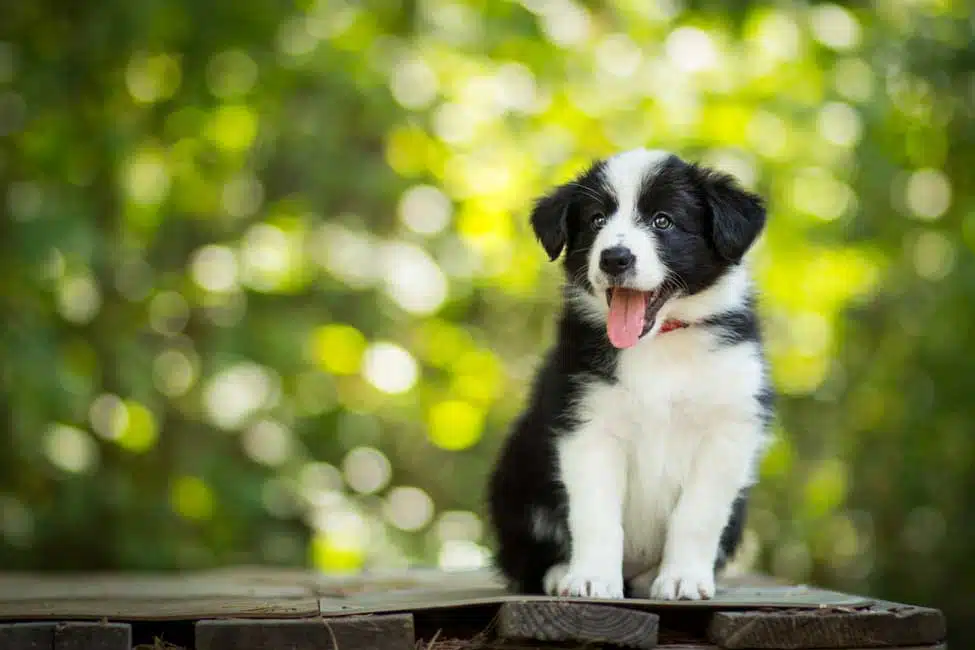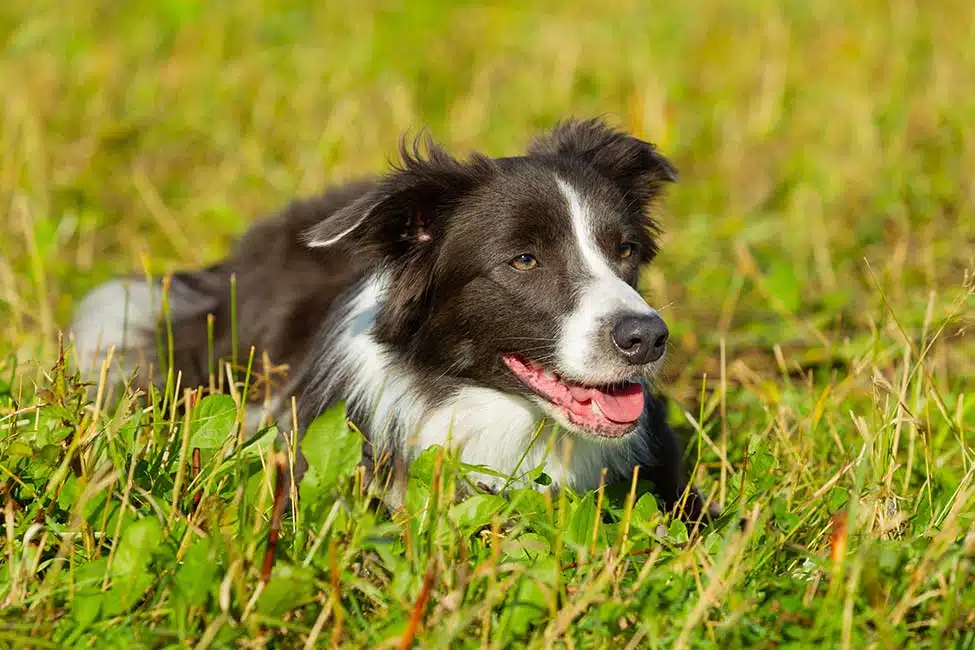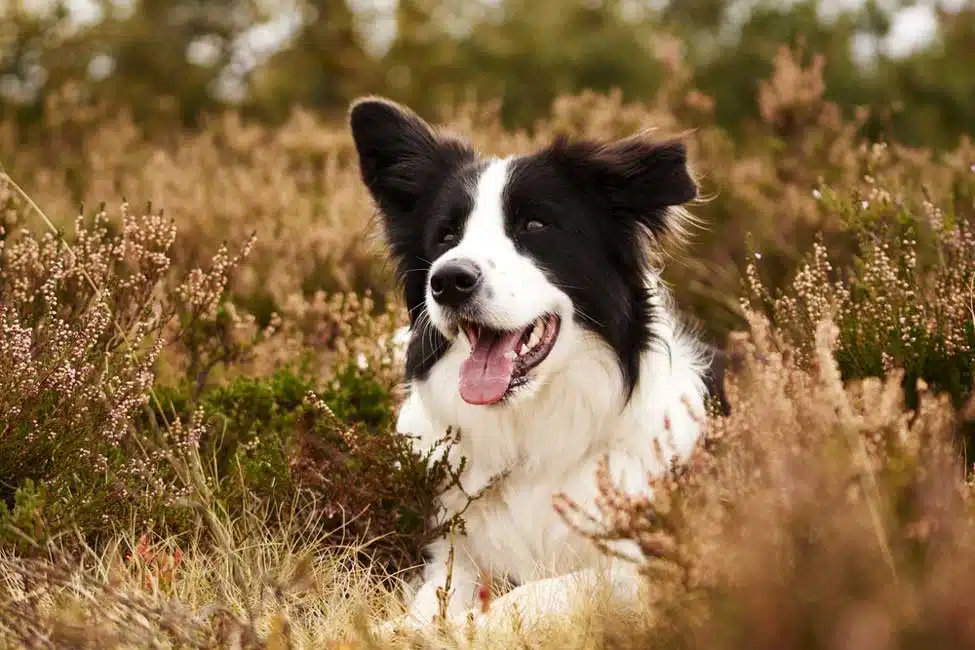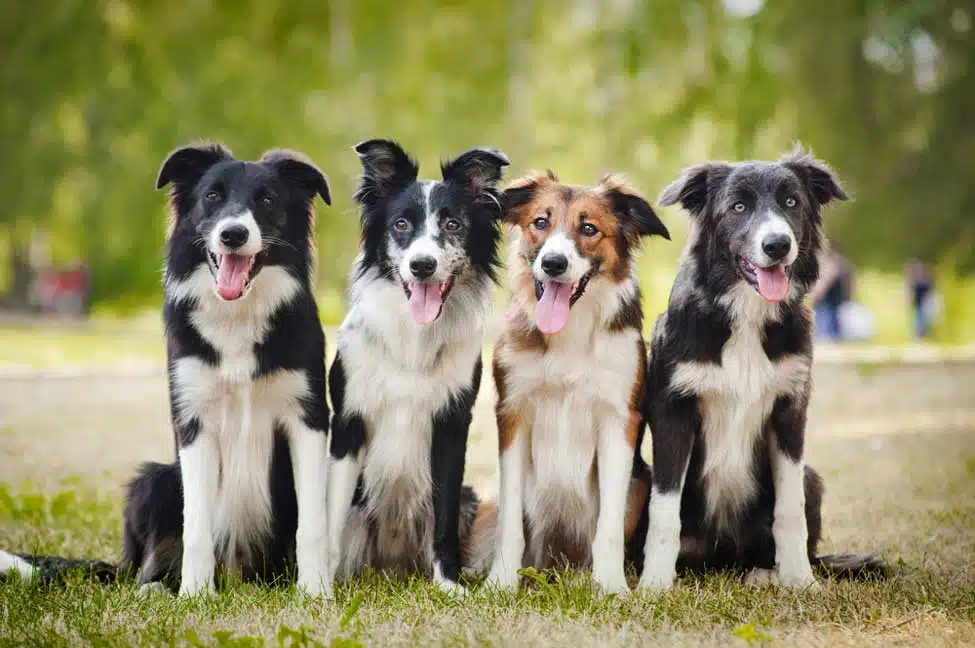
Are Border Collies Hypoallergenic?
The love and companionship of a dog are like nothing else in the world, but for people with allergies, it can also come at a cost. Allergic reactions from a dog is often thought to be the result of shed fur, but the truth is a little more nuanced: those strands of fur carry dried skin flakes – dander – and saliva when they fall away. In essence, humans aren’t really allergic to dog hair or fur, but the proteins found in the animal’s urine, saliva and dander, which are then transported by the hair in the atmosphere. These “hitchhikers” are the real culprits behind allergic reactions that cause symptoms such as runny noses, itchy eyes, and hives in humans. Even these unpleasantries are not enough to turn true dog-lovers away, which is why “hypoallergenic” dog breeds, such as a poodle, are in such high demand.
These dog breeds feature coats that rarely shed on their own, preventing much of the process that introduces allergens into their domestic environment. Border Collies are often a mixed breed crossed with breeds like the standard Poodle, whose interlocking, curly coat fibers form a mat-like structure at the individual hair level, holding onto one another rather than falling away. While not as well-known as popular breeds like the Labradoodle, the Border Collie-Poodle mix known as a Bordoodle or Borderpoo takes on these coat characteristics.
Is A Border Collie Hypoallergenic: Know The Facts
Unfortunately, the standard-breed Border Collie is not considered to be hypoallergenic, for several reasons. The first thing to bear in mind is that truly hypoallergenic dogs – that is, dogs that do not produce any allergy symptoms at all – don’t exist. The breeds considered and called “hypoallergenic” are simply low-shedding breeds with interlocking coats, which means that there is a diminished amount of allergens, not a lack of them. That said, the Border Collie’s double coat produces a fair amount of shed fur, which in turn releases allergens into their environment.
It’s not to say that a human with dog allergies and a Border Collie can’t make a great pair, but certain precautions and a little research are called for. When you understand why a Border Collie isn’t hypoallergenic, it’s easier to clean up your mutual environment – and head off allergy symptoms before they have a chance to manifest.
Understanding The Border Collie Coat
Border Collies get their name from their place of origin – the cold, often damp borderlands between England and Scotland. Bred specifically for herding sheep and cattle, the dog’s life was built to be a working dog that could handle morning-‘til-night working hours that were physically demanding, as well as weather of all varieties. That means that their coat – much like the wooly coats of the sheep they herded – needed to stand up to wind, rain, and cold temperatures. The breed has a distinct long-haired “double coat” which consists of a coarse outer coat and a softer, fluffier undercoat. These two layers work together to slough off rain and hold in body heat, even during the breed’s well-known energetic, nimble maneuvering at high speeds.
There are two varieties of a Border Collie’s coat, just as there are with Collies: a smooth coat and a rough coat. As the names suggest, a smooth-coated Border Collie will look more sleek, with hair that hangs straight down, while a rough-coated will have more volume and loft. Of the two, the rough coat will shed more aggressively, but both can be problematic for those with dog allergies.
Coat Blow: The Truth About Border Collies & Dog Allergies
Just as humans with hair will periodically lose strands each day to make room for new growth, non-hypoallergenic dogs like the Border Collie will lose a little dog hair each day. This is a natural and important process for their overall health, as it keeps their coat shiny and healthy while helping skin to “breathe” at the pore level. That said, a double-coated breed like Border Collies faces a problem each year when the temperature rises: the coat that kept them toasty warm throughout the winter is swiftly becoming a sweaty liability that threatens overheating and exhaustion. The evolutionary answer is a coat blow, which is essentially a fancy terminology for shedding a winter coat for a summer coat.
As any pooch parent of a long-coated breed will attest, coat blow season is a challenge for furniture, rugs, and allergies – particularly if they’re the one suffering from pet allergens. Dogs like the Border Collie will suddenly start to shed excessively, quickly losing their winter coat in favor of a more sparse, summer-ready one. It’s important for their temperature regulation to dump as much of their formerly-insulating coat fur as quickly as possible, which means their owners have to be more diligent with the dog brush, vacuum, and lint roller – as well as allergy medications.
To Cut or Not To Cut: Grooming & Border Collies
While it might be tempting to bring a dog to a groomer to simply get a buzz cut, it is worth remembering that the shedding and coat-growing process was created by nature: it’s designed to keep a dog cool by raising and lowering fur at the strand-level using the skin. Removing this innate process might actually make it harder for your dog to stay cool. Therefore, if you’re considering taking steps like this, be sure to talk to your vet for advice first.
Keeping this information in mind, professionally grooming a breed such as the Border Collie on a regular basis is a good idea. In addition to keeping debris out of their fur, it will remove dust and dander that may trigger allergies in both you and your dog. Even with their impressive coats, dogs can get skin allergies, too – and they can be absolutely miserable. Imagine breaking out in hives and rashes under a fur coat you couldn’t take off!
Fighting Back Against Dog Allergies
For true dog lovers and Border Collie enthusiasts, a little sniffling and sneezing won’t keep them from the pups they love so dearly. While the Border Collie may not fall among the hypoallergenic dog breeds (even the Borderpoo isn’t allergen-free), the literal fallout from their coat can be minimized and contained to prevent allergy flare-ups in the home. Here are some crucial steps owners with allergies can take to ensure both canines and humans live in harmony:
- Grooming: This is the number one most important point to consider when reducing allergens in Border Collies. If shedding is what introduces allergens to their environment, proactive grooming will reduce it significantly. Brushing your Border Collie’s dog hair regularly will help immensely – make a habit of sitting outside with your pup and using gloves to protect your skin from dust and dander. A regular dog brush, grooming glove, or a special metal loop called an undercoat rake can all be helpful tools for removing excess hair and undercoat and retrieving a smooth collie.
- Clean-up: Once fur has fallen away from a dog’s coat, the fewer places it has to hide means the allergens have less chance to invade the environment. Invest in a good pet-specific vacuum with features like a HEPA filter to suck up these offending invaders. Use throw blankets over couches and chairs where the dog likes to lay down, and wash them frequently in hot water. Whenever possible, choose dog beds or crate pads that are machine-washable to further assist with clean-up. For whole-home containment, change your HVAC system air filters on their recommended schedule, or more often if necessary.
- Containment: It’s important for your Border Collie’s health and happiness to spend time with you, but that doesn’t mean they need access to every room of the house. Keeping dogs out of the bedroom, for example, will help you sleep peacefully through the night without allergy flare-ups. The best rooms for spending quality time with your pup while keeping allergies at bay are those with smooth floors, rather than carpeting, which can hold on to hair and allergens. When swept and mopped on a regular basis, these floors ensure that allergens have no place to go but in the garbage or into the vacuum filter.
- Medication: While grooming and diligent home cleaning will put a significant dent in allergy flare-ups over time, it won’t eliminate issues entirely. If you’re still experiencing unpleasant symptoms but are determined to live in harmony with your canine companion, talk to your doctor about your medication options. People with allergies can get by with a daily over-the-counter medication just for coat blow season, while others may do better with a periodic allergy shot to keep symptoms manageable.
Border Collies, Human Allergies & Dog Ownership: Do The Right Thing
So, does a Border Collie puppy fall under one of the hypoallergenic dog breeds? No. Does that mean they can’t find a loving home with people with allergies? Happily, that answer is also no. It does take a little work to contain the fur they shed, but not as much as new owners might imagine. Each of these steps falls mostly under precaution and diminishing the impact of a coat blow when the seasons change. If you have allergies to dogs but still want a Border Collie to love, don’t let a runny nose stop you from potentially finding your new best friend.
However, if your allergies are severe, weigh the pros and cons carefully: you may want to try fostering a Border Collie if possible from your local shelter, or at the very least, visit a rescue or pet store with Border Collies to see how you react. Make sure to spend adequate time handling the dog, and wait a few hours to see if symptoms develop (if any), as sometimes allergies don’t flare up right away. Since we all know our own bodies the best, you’ll have a better idea as to the best course of action once you spend time with this breed – i.e., if you foresee yourself cohabitating comfortably with a four-legged companion of the Border Collie variety. After all, you don’t want to adopt a sweet pup only to have to give him up for adoption because of the sniffles, so be honest with yourself (and your potential new BFF)!
If you’ve gone through all the paces and decide to go for it – allergies and all – congratulations on becoming a proud owner of a Border Collie! As we’ve explored, this energetic breed is a fabulous addition to any home. Smart, agile, and easy to train, they make wonderful companions and are especially great pets for active owners. Since this breed sheds quite heavily, it’s important to feed them nutritious, quality-protein dog food such as Lucy Pet Formulas to ensure a smooth coat and healthy skin, as well as overall good health. Speak to your vet about any dietary concerns, and you’re sure to create wonderful memories with your new fur baby for years to come!





Leave A Comment
You must be logged in to post a comment.